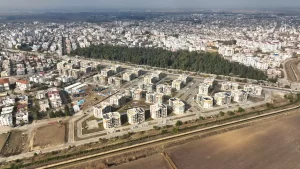What Has Emerged From 30 Years Of The Orangi Pilot Project
Introduction:
The Orangi Pilot Project (OPP) was established in February 1980 through an understanding between Akhtar Hameed Khan, a renowned South Asian social scientist, and Agha Hasan Abidi, the president of the BCCI foundation, a Pakistan charity. Agha Hasan Abidi wanted Akhtar Hameed Khan to do “social work” for the refugees from East Pakistan who were living in Orangi, a Karachi township consisting of a large number of informal settlements. Akhtar Hameed Khan disagreed with the concept as he did not wish to do “charity work” and also did not want to work for a particular community.

However, he proposed that he would study the situation in Orangi and come up with community-based solutions for the improvement of the physical and social conditions in the settlements. This was agreed upon, as was the idea that the project would be open ended; it would have no timelines but would provide regular quarterly reports on its progress, as well as submit detailed financial accounts with those reports.
The Development of a Model:
For the first six months, Akhtar Hameed Khan roamed Orangi, in a jeep supplied by the BCCI foundation. He spoke to politicians, activists, community leaders, shopkeepers’ organizations, and local counselors. He analyzed their relationships with the process of lobbying for services in Orangi and came to the conclusion that for the people of Orangi, the most important social and physical development issue was sanitation and that a community-based program could be built around it. He observed that people were already building their underground sewage systems but the scale was too small and the quality of work was so bad that most of the systems clogged up in a few months.
First Attempts:
Akhtar Hameed Khan contacted well-known sanitation engineers and architects to help him design a community-financed and -managed sanitation system. He abandoned those efforts because their solutions were far too expensive and sophisticated for the community to finance and build. Subsequently, he sought the help of an instructor at the Orangi Pilot Project OPP to design and implement a system in the Hanifabad neighborhood in Orangi, which had agreed to follow the Orangi Pilot Project OPP model and finance underground sewers in their lanes (Hasan, 2010). Within a year, the system had clogged up and the residents were unhappy.
Conflicts With Engineers:
Since all developments in Orangi were closely monitored by the engineering profession, technical personnel in the Karachi Water and Sewerage Board (KWSB), the Karachi Metropolitan Corporation (KMC), and elected local counselors, the proposals made by AH came under attack, for technical and social reasons. In 1982, this criticism received considerable support from the United Nations Centre for Human Settlements (UNCHS) appointed chief technical advisor (CTA) to the project.
The Orangi Pilot Project OPP’s Impact on Development Concepts and Practices:
Given the Orangi Pilot Project OPP institution’s reputation of transparency and honesty along with the tested knowledge and expertise that it possesses and the partners it has all over Pakistan, the OPP-RTI is on its way to recovery. The OPP-RTI has had a major impact on the theory and practice of development in Pakistan:
1. Public awareness: The Orangi Pilot Project OPP put the katchi abadis on the development map of Pakistan. Before that the katchi abadis were considered as problem areas of crime and violence. Today, they are looked upon as consisting of human beings who are indispensable to the city’s economic and social life and who need better living conditions.
2. On policy: In five-year plan documents, housing policy, sanitation policy, and katchi abadi policies (in the formation of which the OPP was involved), the OPP-RTI model of development has been proposed and is also being practiced through various government programmes such as Saaf Paani in the Punjab and by the katchi abadi directorate in the Punjab and the SKAA in Sindh.
3. On academia: AH and Perween Rehman both have taught at Dawood University, NED University, and Karachi University; more recently, AH has taught at Sir Syed University.
The Orangi Pilot Project OPP’s Impact on the Housing Sector of Orangi:
In 1982, the lanes that had constructed their underground sewage system requested the OPP to initiate a housing programme through which they could improve their homes. The OPP launched the programme in 1986. The OPP observed that over 70,000 housing units had been developed in Orangi without any assistance from the government. Most of these houses were of poor construction and design, but it was obvious that a process for their construction was in place.
Conclusion:
The most important conclusion that emerges from the history of the OPP is that its success owes a lot to the stature and reputation of its founder, Akhtar Hameed Khan. For him, all doors in government and academic institutions were open. He could also dictate his terms and get his financers to accept that the OPP would be an open-ended project. Orangi has changed since 1981 when OPP began.
Also Read: Policies to Promote Affordable Housing in Pakistan Challenges and Lessons Learned
